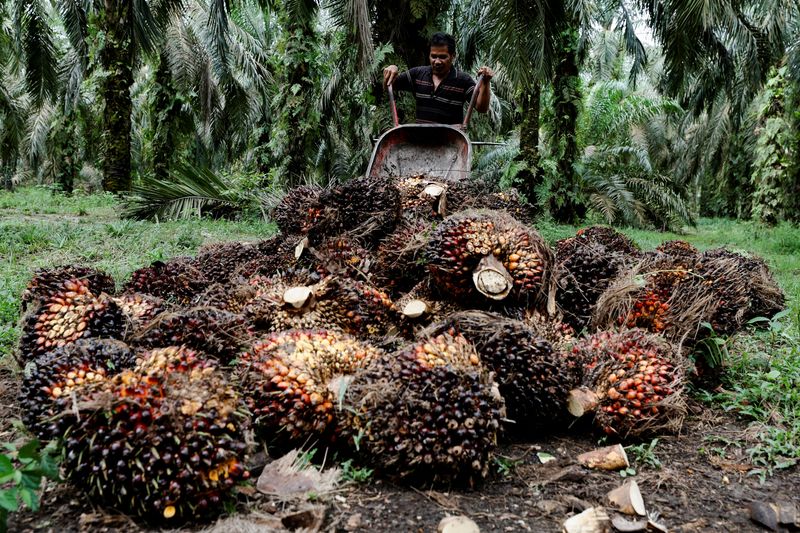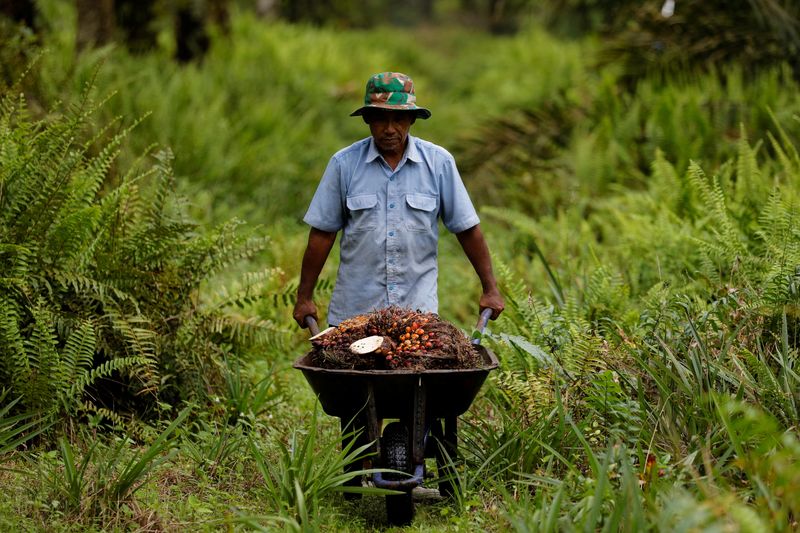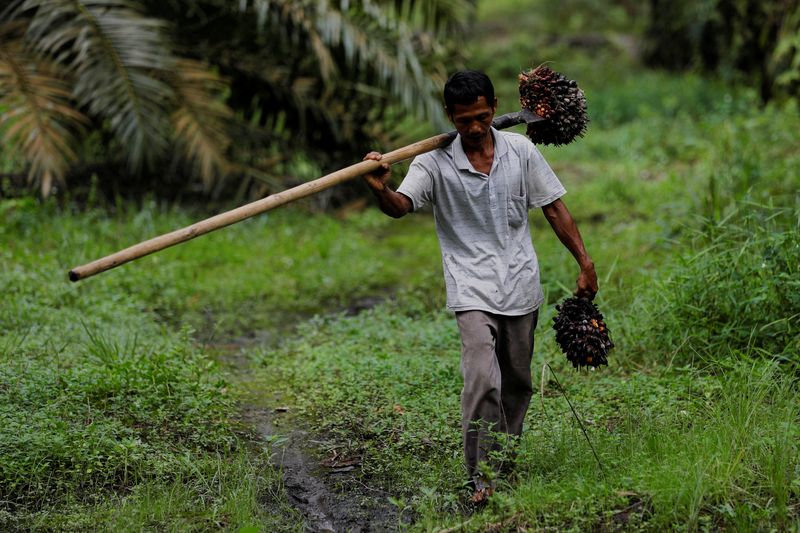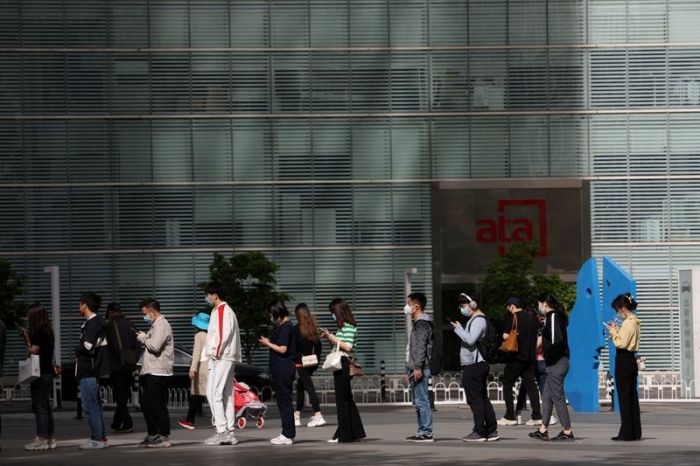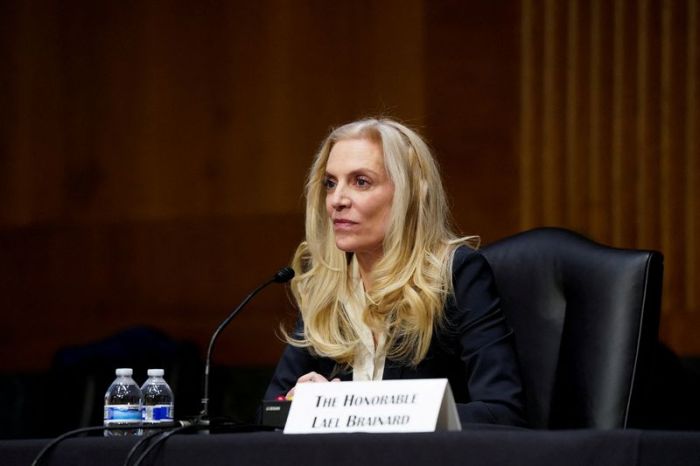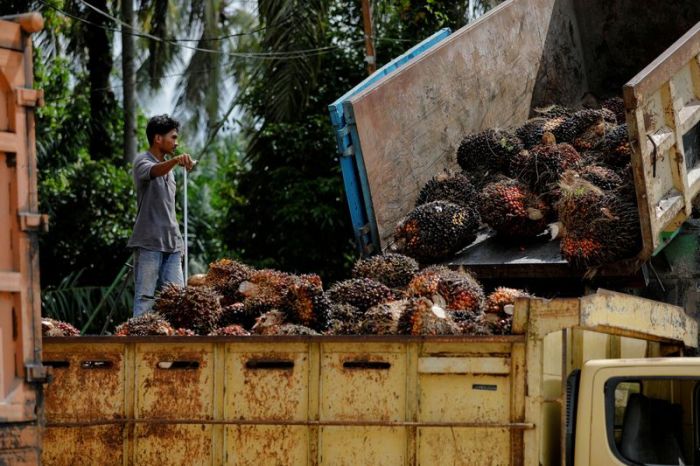JAKARTA (Reuters) -Indonesia will ban exports of RBD palm olein from midnight on April 28 until prices of bulk cooking oil drop to 14,000 rupiah per litre, a senior minister said on Tuesday, while a document showed it was prepared to widen the ban if there are shortages.
The export ban will be imposed on all producers of refined, bleached and deodorized (RBD) palm olein and applied on products under three HS codes, chief economic minister Airlangga Hartarto said in a statement.
RBD palm olein, which is produced by crushing palm fruit and then processed to remove impurities, accounts for about 40% of Indonesia’s total shipments of palm oil products, according to analysts’ estimates, which means the ban could significantly affect export earnings in Southeast Asia’s biggest economy.
The export ban will stay “until bulk cooking oil price reach the targeted 14,000 rupiah per litre throughout Indonesia,” Airlangga said.
Bulk cooking oil was offered at about 20,000 rupiah ($1.39)per litre at online marketplaces on Tuesday. In some traditional markets, they were sold at around 17,000-19,000 rupiah per litre, state news agency Antara reported.
The policy will be evaluated periodically and will continue to be adjusted according to the most current situation, he said.
The government is prepared to widen its ban on exports of refined palm olein if it faces domestic shortages of derivatives used in the production of cooking oil, according to details presented at a meeting between government and industry officials.
The world’s biggest palm oil maker will allow exports of crude palm oil or other derivatives from Thursday, senior government official Musdhalifah Machmud, who verified the details presented, told Reuters.
Indonesia typically exports about $2.5 billion to $3 billion of palm oil products per month.
Authorities will strictly monitor domestic supply of refined palm oil and crude palm oil, which are used as raw materials to make RBD olein, according to presentation slides.
“If there is shortage of refined palm oil, then further export bans can be carried out,” read the text on a slide shown to palm oil companies on Monday.
China, India, the Philippines and South Korea, source between 46% and 58% of their total palm oil imports from Indonesia, Nomura said in a research note, adding that China was the top buyer of Indonesia’s RBD olein.
President Joko Widodo announced the ban on exports of cooking oil and its raw material on Friday to help control soaring domestic prices, but provided no details.
The announcement has sent global edible oil prices soaring as supplies were already choked by other factors such as drought and shortages from Russia’s invasion of major crop producer Ukraine.
Markets had previously thought the ban would cover a wider range of palm oil products, sending the rupiah and shares of Indonesian palm oil companies tumbling on Monday.
The rupiah rebounded 0.3% on Tuesday, while palm company shares also gained. Malaysian benchmark crude palm futures, which had reversed gains after details of the ban emerged, rose 1.5% by 0900 GMT on Tuesday.
PRESIDENT’S APPROVAL RATING FALLS
Airlangga said a trade ministry regulation will be issued soon.
Indonesia’s ban on palm oil exports is unlikely to last more than a month as Jakarta has limited infrastructure to store the surplus oil and the country faces mounting pressure from buyers to resume shipments, industry officials said.
The Indonesian government has been criticised by some analysts and politicians for erratic policymaking to contain the rise in cooking oil prices, having already implemented and revoked an export restriction this year.
Approval ratings for Jokowi, as the Indonesian president is popularly known, dropped to 59.9% this month from 75.3% at the beginning of 2022, due to rising prices of necessities including cooking oil, independent pollster Indikator Politik Indonesia said.
More than 60% of respondents in the survey, which was conducted before the export ban was announced, also supported halting cooking oil shipments.
Students have held street demonstrations in several cities across the archipelago this month to protest against high cooking oil prices.
($1 = 14,410.0000 rupiah)
(Additional reporting by Stefanno Sulaiman, Fransiska Nangoy and Stanley Widianto in Jakarta and Tom Westbrook in SingaporeWriting by Gayatri Suroyo and Fransiska NangoyEditing by Ed Davies, Jacqueline Wong and David Evans)

